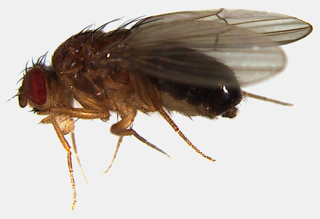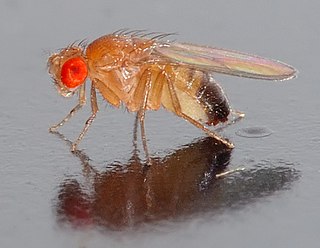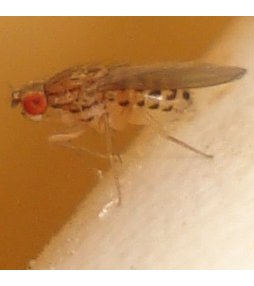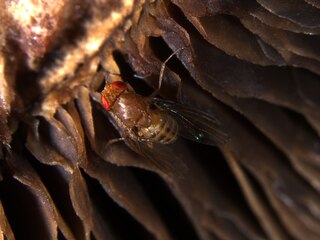
Drosophila funebris is a species of fruit fly. It was originally described by Johan Christian Fabricius in 1787, and placed in the genus Musca but is now the type species of the paraphyletic genus Drosophila. Drosophila funebris is a member of the Immigrans-tripunctata radiation of the subgenus Drosophila.

The Drosophilinae are the largest subfamily in the Drosophilidae. The other subfamily is the Steganinae.

The paraphyletic subgenus Sophophora of the genus Drosophila was first described by Alfred Sturtevant in 1939. It contains the best-known drosophilid species, Drosophila melanogaster. Sophophora translates as carrier (phora) of wisdom (sophos). The subgenus is paraphyletic because the genus Lordiphosa and the species Hirtodrosophila duncani are also placed within this subgenus.

The subgenus Dorsilopha belongs to genus Drosophila and consists of four species. The phylogenetic position of this group has been unclear for a long time, but recent studies have shown that the subgenus is positioned ancestral to the subgenus Drosophila.
The subgenus Dudaica belongs to genus Drosophila and consists of two species, Drosophila malayana and Drosophila senilis Duda, 1926.

The immigrans-tripunctata radiation is a speciose lineage of Drosophila flies, including over 300 species. The immigrans-tripunctata radiation is a sister lineage to most other members of the subgenus Drosophila. A number of species have had their genomes or transcriptomes sequenced for evolutionary studies using Drosophila.

Drosophila is a paraphyletic subgenus of the genus Drosophila, a classification of fruit flies. This subgenus was first described by Alfred Sturtevant in 1939. Members of the subgenus Drosophila can be distinguished from other Drosophilid species by breaks in the pigmentation along the dorsal section of their abdomen.

The genus Zaprionus belongs to the family fruit fly Drosophilidae and is positioned within the paraphyletic genus Drosophila. All species are easily recognized by the white longitudinal stripes across the head and thorax. The genus is subdivided in two subgenera, based on the presence of an even or odd number of white stripes. The species of the genus can be found in African and Southern Asia. One species, Zaprionus indianus, has invaded the New World.

Drosophila appendiculata is a large yellowish fruitfly found in Southern Chile and neighboring Argentina. The species is placed in its own unique subgenus, Chusqueophila, based on the presence of three partial cross-veins in the wing.

Drosophila immigrans is a species of vinegar fly in the family Drosophilidae. Drosophila immigrans is a member of the Immigrans-tripunctata radiation of the subgenus Drosophila. It is related to the Drosophila quinaria and Drosophila testacea species groups, and the fellow Immigrans species group member Drosophila albomicans. Drosophila immigrans has been used in evolutionary studies to understand how viruses evolve with their hosts.
The Drosophila cardini species group belongs to the subgenus Drosophila of vinegar flies in the Immigrans-tripunctata radiation of the subgenus Drosophila. The closest relatives of Cardini species include Drosophila bizonata, Drosophila quinaria, and Drosophila testacea species groups, comprising mushroom-feeding flies. Cardini group species likely derived their more general feeding ecology from a mushroom-feeding ancestor, an evolutionary transition in feeding similar to Drosophila quinaria.

The Drosophila immigrans species group is a polyphyletic and speciose lineage of Drosophila flies, including over 100 species. Immigrans species belong to the Immigrans-tripunctata radiation of the subgenus Drosophila. Well-described species include Drosophila immigrans, and the sister species Drosophila albomicans and Drosophila nasuta. The genome of D. albomicans was sequenced in 2012 in an effort to characterize novel sex chromosome development in D. albomicans. Immigrans group species are related to mushroom-breeding Drosophila of the Quinaria and Testacea species groups.
The Drosophila guarani species group is a lineage of vinegar fly in the Immigrans-tripunctata radiation of the subgenus Drosophila first proposed by Dobzhansky & Pavan (1943). At least 24 species have been described, distributed throughout latin america.
Drosophila dissimilis is a species of fly in the subgenus Dudaica.
Drosophila gracilipalpis is a species of fly in the subgenus Dudaica.
Drosophila orthophallata is a species of fly in the subgenus Dudaica.
Drosophila puberula is a species of fly in the subgenus Dudaica.
Drosophila qiongzhouensis is a species of fly in the subgenus Dudaica.
Drosophila malayana is a species of fly in the subgenus Dudaica.
Drosophila senilis is a species of fly; it is the type species of the subgenus Dudaica.








